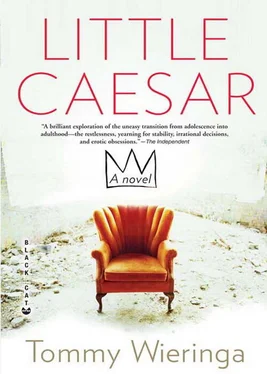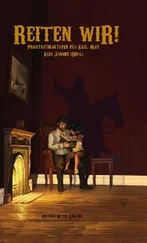Above the nymph was a state portrait of Franz Joseph in uniform, one hand on his waistcoat, his gaze fixed on a point outside the frame. The high ceiling was a patchwork of gilded coffers. The candelabra was unlit.
At the royal suite I turned right and went to our room. My mother was lying in bed, flipping through a hotel folder. I disappeared into the bathroom and heard her say, ‘I don’t understand why they put us in this room. Just look at all the things they have. If you ask me, they only gave us a Deluxe Junior. .’
A few minutes later I closed the double doors and crawled into the freshly made bed. The pillow propped up beneath my arm, I began my third letter to Sarah, on hotel stationery.
Our farewell had been torment. She said she would never see me again. I remained noncommittal about everything important.
‘Then it’s over, Ludwig. You can’t just come back some day and expect everything to be the way it was. That’s impossible. That’s not fair.’
I tasted tears in a kiss, but couldn’t allow myself any feelings, otherwise my entire plan would be scotched. I had withdrawn from the course of events.
‘Isn’t your girlfriend coming along?’ my mother asked at LAX.
‘She has to work.’
‘That’s a pity. Couldn’t she get some time off?’
‘Who knows.’
‘Are you two still getting along?’
‘It’s over.’
Her so-called sympathy was too meager to measure. In response to my ongoing silence she said at last, ‘Just remember what my father always said: there are plenty more fish in the sea.’
I wrote to Sarah about my love, about the loss. That I had wanted to make the goodbye quick and painless, but that it had been neither. That I begged her to wait for me until I returned from my mission. If no country is home to you, than I shall make my home in love. I signed it Odysseus and switched off the reading light. On the other side of the door, Calypso was snoring.
At breakfast she asked about my plans. Not for today, but for the time to come. She avoided the word future . There had been that morning in Los Angeles when I had told her that I would go with her to Vienna.
‘If you like,’ she’d said, and asked no further questions.
Now the moment had arrived to ask those questions, of an early morning along the Ringstrasse in Vienna, our eyes still puffy with sleep and with a day stretching out before us for which they were predicting rain and an afternoon high of two degrees.
‘In early January we’re going to Prague,’ she said. ‘What are your plans?’
I looked past her, at the girl replenishing the buffet. She had said we , without including me. I hadn’t shared with her my thoughts about my life as sacrifice. My mother didn’t understand that I was her homecoming. I wavered, thrown off balance by her question, the need to adopt a stance.
‘To watch after you,’ I said then.
‘Being together has to be enjoyable, Ludwig,’ she said, ‘you have to contribute to each other’s joy in life. .’
I put my empty eggshell back in the egg cup, upside down.
‘But you don’t give me that feeling at all. Are you listening?’
I tapped my spoon against the eggshell. It resulted in an interesting web of fractures.
‘Today I’m going to the Capuchin Crypt,’ I said. ‘I believe virtually all the Habsburgs are buried there, the whole shooting match. A sepulcher. A tourist attraction. Living people looking at dead ones.’
‘What am I supposed to do with you, Ludwig, when you’re so. .?’
‘How late will you be coming back from your activities? Will we be dining together?’
‘Why would you want to? You don’t seem to derive any pleasure from it. You almost never talk to me, you never smile. I find it. .’
She wept. Foul play. I felt the urge to do the same. Before leaving the breakfast room, I laid my hand on her shoulder.
‘Hang in there,’ I said.
‘Go away, you. You disgusting. . cynic.’
*
I crossed the ring to Heldenplatz, then through the arches to Hofburg. In a daze, I wandered past the inviolate, dead-as-a-doornail remains of an empire, petrified and sunken beneath its own weight.
The enormity of it! The countless tons of stone!
The perpetrators of this rank self-aggrandizement all lay in the Capuchin Crypt, domes buried beneath a church on Neue Markt, the final resting place since 1633 to the Austrian Habsburgs. After paying admission, I descended into that underworld. Sober cross vaults, the walls in pale plaster. Almost one hundred and fifty of the deceased were interred here in an equal number of sarcophagi, from newborn children to doddering emperors. Grand dukes, counts, countesses. Princes, princesses, emperors, empresses. I pictured in my mind’s eye how they were carried in here amid the murmur of mourners, the shuffling monks and the wavering light of torches. A book I bought at the entrance described how that went. The funeral official knocks on the door of the crypt with his staff and asks to be admitted. The monk on the other side of the door asks who it is who wishes to enter. The official calls out the name and most important titles of the deceased, resumés that sometimes took a while, grand duke of this or that, lord of that and the other, knight in the order of so and so, et cetera. But the door remains closed, the voice says: We know no such person .
Again the official knocks on the door. The question is repeated, there follows a summary of the dead person’s secondary titles, the minor titulature.
We know no such person.
The ritual repeats itself, again the official announces the name of the deceased, followed by the words a poor sinner . The door to the crypt is opened.
*
A route had been set out amid the sarcophagi. Eagles spread their wings atop coffins of lead, tin, bronze or copper, crowned skulls grinned at passers-by. Scenes from the life of the deceased were portrayed in haut-relief: a wedding, a coronation, a battle. They had succumbed to inbreeding, crib death, epidemics, venereal diseases, fevers and hunting accidents. Their hearts were removed and kept elsewhere. The eyes, brains and entrails were interred in yet another chapel.
The vanitas symbolism of skulls and bones became less profuse with time, as the empire reached its end the sarcophagi became less ornate. I saw coffins containing Ludwigs, a certain Ludwig Joseph of whom the booklet noted only that he was the son of Emperor Leopold II, and a Karl Ludwig, father of Crown Prince Franz Ferdinand and brother of Franz Joseph I. The editors had apparently seen no reason to make special mention of them.
In a nearby coffeehouse I read about the enlightened Emperor Joseph II, who had opened the royal gardens at Schönbrunn and the Prater to the public. A distressed noblewoman had complained to him, ‘But Your Majesty, if you allow the people into the royal gardens, our kind of people can never gather there again!’
‘My dear lady,’ Joseph had replied, ‘if I wished to always be among my own kind, I would spend my days in the Capuchin Crypt.’
The air outside was cold and biting, with a strong odor of manure. I was walking through a dark gallery along Augustinerstrasse when suddenly a horse-drawn carriage came racing past. The coachman wore a broad-rimmed hat, a black, heavy cape draped over his shoulders. The black coach was empty, the rattle of hooves echoed from the walls. That is Mr. Death, who rides the streets of Vienna.
That evening I took a walk along the Danube and went into a few of the big hotels. All of them had a pianist in the lobby or the bar, surrounded by the workings of the hotel, ghosts in the machine. There would be work for me here, I knew that. Something appealed to me about the idea of being a harmless parasite, living off the rich, chipping off bits of their monolithic capital. I sensed what my role would be — creating the impression of being a lost prince, stirring them up to acts of compassion.
Читать дальше












